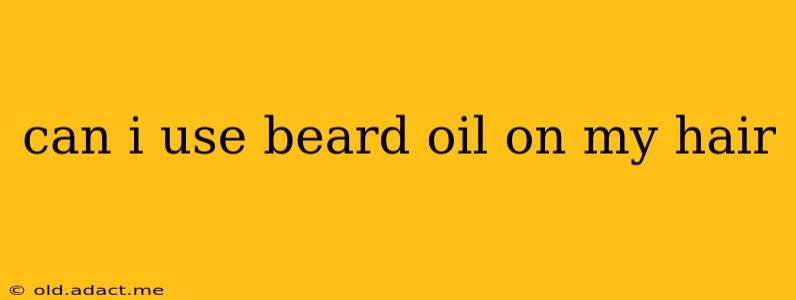The question of whether beard oil can be used on hair is a common one, sparking curiosity among those seeking natural hair care solutions or simply looking to repurpose their existing products. The answer isn't a simple yes or no; it depends on your hair type, the specific beard oil composition, and your desired outcome. Let's delve deeper into the possibilities and considerations.
What are the Benefits of Using Beard Oil on Hair?
Many beard oils are formulated with natural ingredients that can benefit both beards and hair. These often include carrier oils like jojoba, argan, or grapeseed oil, known for their moisturizing and nourishing properties. Essential oils, added for fragrance and potential therapeutic benefits, can also contribute to a healthier scalp and hair. Therefore, using beard oil on your hair might offer:
- Increased Moisture: Dry, brittle hair can benefit from the moisturizing effects of the carrier oils found in most beard oils. This can lead to improved shine, reduced frizz, and softer, more manageable hair.
- Improved Scalp Health: Some essential oils in beard oil have anti-inflammatory and antiseptic properties that could potentially soothe an irritated scalp and reduce dandruff.
- Enhanced Shine: The oils can coat the hair shaft, reflecting light and creating a natural, healthy shine.
- Protection from Environmental Damage: Beard oils can offer a degree of protection against the damaging effects of sun, wind, and pollution.
What are the Potential Drawbacks of Using Beard Oil on Hair?
While beard oil may offer benefits, it's crucial to be aware of potential drawbacks:
- Greasiness: Beard oils can be quite heavy, leaving hair feeling greasy or weighed down, especially if used excessively or on fine hair. This is a significant concern for many people.
- Build-up: If not properly rinsed, the oils can build up on the scalp and hair, leading to clogged pores and potentially worsening dandruff or other scalp conditions.
- Unsuitable for Certain Hair Types: People with fine or oily hair are likely to experience more negative effects than those with coarse, dry hair.
- Potential Allergic Reactions: Individuals with sensitivities to certain essential oils should proceed with caution and conduct a patch test before applying to the entire scalp and hair.
What Type of Beard Oil is Best for Hair?
Not all beard oils are created equal. Look for beard oils with lighter carrier oils like jojoba or grapeseed oil, rather than heavier ones like coconut or castor oil. These lighter oils are less likely to weigh down your hair. Avoid oils with strong, overpowering fragrances, particularly if you have sensitive skin or scalp. A simple blend with minimal added fragrances is ideal for a trial.
How to Use Beard Oil on Your Hair?
If you decide to try beard oil on your hair, start with a small amount (a few drops). Apply it to damp hair, focusing on the ends, and gently work it through. Avoid applying it directly to the scalp unless you have a very dry scalp. Rinse thoroughly to prevent build-up. Start with once-a-week application to assess its impact on your hair.
Will Beard Oil Make My Hair Greasy?
This depends entirely on your hair type and the oil itself. Individuals with oily or fine hair are more likely to experience greasiness. Using a small amount and focusing on the ends, rather than the scalp and roots, can minimize this risk. Experiment to find what works best for your specific hair needs.
Is Beard Oil Good for My Hair?
Whether beard oil is "good" for your hair depends on your individual needs and hair type. For those with dry, coarse, or damaged hair, it may offer significant benefits. However, those with oily or fine hair should proceed with caution. A small-scale trial is recommended before committing to regular use.
Conclusion
Using beard oil on your hair presents a potential solution for those seeking natural moisture and nourishment. However, careful consideration of your hair type and the oil's composition is crucial to prevent unwanted side effects like excessive greasiness or build-up. Always begin with a small amount and observe your hair's response before incorporating it into your regular hair care routine. Remember, a patch test is always a wise precaution before applying any new product to your scalp and hair.
